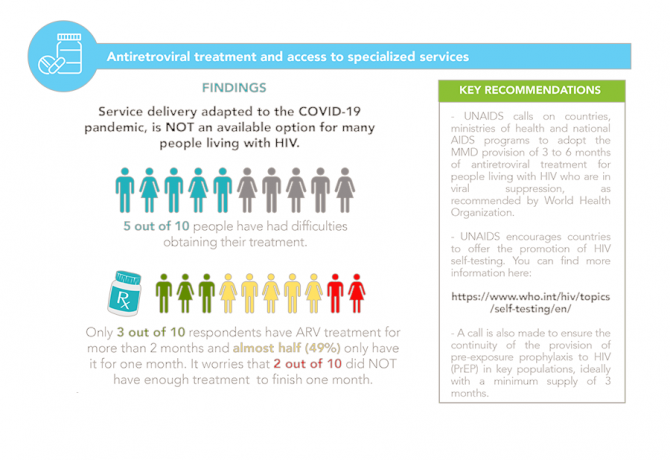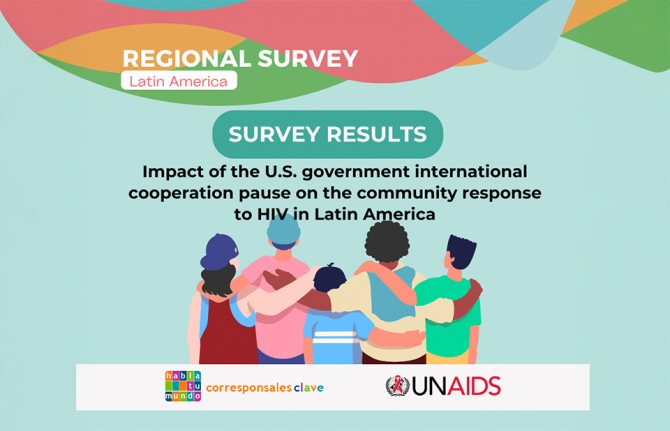

Feature Story
Survey shows that many people lack multimonth HIV treatment in Latin America
24 June 2020
24 June 2020 24 June 2020Once the COVID-19 lockdown in her country was put in place, Marisela Mariño (not her real name), a transgender woman living with HIV, immediately contacted her treatment provider, convincing them to supply her with antiretroviral therapy to last at least two months.
“I was saved by having the phone number of one of the health promoters at the clinic I attend,” said Ms Mariño. But now she, like seven out of 10 people who responded to a Latin American regional survey on the needs of people living with HIV during the COVID-19 pandemic, does not have enough antiretroviral medicines for a lockdown of more than 60 days.
From the online survey, which was answered by 2300 people from 28 countries in the region, it was seen that despite the communication efforts by national health authorities and the international organizations that are leading the response to COVID-19, 31% of people stated that they had not received sufficient information on preventing the transmission of the new coronavirus. More than half, 56%, expressed that they do not have sufficient personal protective equipment, while only 22% of people think that masks are a useful protection against COVID-19.
Claudia Cardenal (not her real name), another transgender woman in the region, says that the offer of services adapted to the COVID-19 pandemic is not reflected in the options for people living with HIV. Ms Cardenal only has antiretroviral treatment for one more month, despite the World Health Organization recommendation that people living with HIV have at least a three-month supply.
The survey also shows that five out of 10 people are having difficulties in obtaining their antiretroviral treatment during the pandemic and less than two out of 10 people had antiretroviral medicines delivered to their homes.
Only three out of 10 people have been offered the option of telemedicine, and four out of 10 people living with HIV in Latin America state that they need psychological support to address anxiety related to COVID-19.
Stigma and discrimination continues to be an important barrier for people living with HIV to fully access their rights. More than half of the people surveyed, 56%, believe that they could suffer physical, psychological or verbal violence due to living with HIV in the midst of the COVID-19 pandemic. Forty per cent answered that they do not know where to go or call in the event that they encounter violence or discrimination due to living with HIV and the fear of discrimination caused three out of 10 people to refrain from accessing services in the midst of lockdowns.
Confinement can increase and incentivize stigma and discrimination. For example, in countries that have rules on leaving one’s home under the lockdown based on gender, violence to people with a different gender identity or expression than that appearing on their official identification may increase.
Job loss or lack of income was a top concern in the findings of the survey. Mobility restrictions and compulsory quarantines have deprived four out of 10 people who needed to leave their homes for work of their income, which means that four out of 10 people require nutritional support and/or cash transfers.
From the results of the survey, it is clear that the response to COVID-19 should consider the realities of people’s lives and focus on removing the barriers that people face to protect themselves and their communities.
Countries, ministries of health and national AIDS programmes should ensure access to three months or more of antiretroviral therapy by all people living with HIV, including refugees and migrants. In addition, the provision of food and other social protection services, including temporary shelters for key populations, people living with HIV and other vulnerable people, must be ensured.
The provision of services and support to the populations most affected by violence, especially women and girls, also needs to be a key priority for governments.
“This evidence has been shared with Cosponsors, national AIDS programmes and civil society organizations. I urge them to push for multimonth dispensing of antiretroviral therapy, social protection measures focusing on key populations and people living with HIV and support for mental health initiatives,” said César Núñez, Director of the UNAIDS Regional Support Team for Latin America and the Caribbean.



